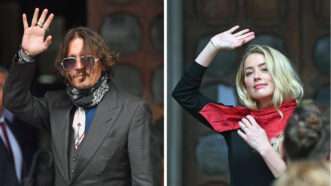Libel
Why Isn't Johnny Depp v. Amber Heard Foreclosed by Depp's Loss in an English Libel Case?
It's chiefly because Virginia doesn't recognize nonmutual collateral estoppel, of course!
"Judge Dismisses Bogus Defamation Lawsuit Against Foxconn Critic"
The Institute for Justice, which represented the critic, so reports.
Tennessee Court Expresses Doubt About Whether Anti-Libel Injunctions Are Allowed Under Tennessee Law
The underlying lawsuit was brought by Mickell Lowery, a Commissioner for Shelby County (which contains Memphis)—and son of longtime Memphis City Councilman Myron Lowery, who had also briefly served as Mayor—over allegedly libelous statements during his election campaign.
Court Declines to Enter TRO Ordering Defendants to "Retract … Complaints … to Amazon"
The court so holds as a matter of the law of remedies, though I think such an order would generally be an unconstitutional prior restraint as well.
U.S. Senate Candidate Alan Grayson Loses Libel Lawsuit
Criticism of Grayson (who's now running in the 2022 Florida Senate primary) in his losing 2018 House campaign was based on "articles by independent, reputable sources," and there wasn't clear and convincing evidence that the defendants knew their statements were false or likely false (the so-called "actual malice" standard).
"May Be The Most Helpful Brief I've Ever Read,"
said Judge Vince Chhabria (N.D. Cal.) about this amicus brief from Paul Alan Levy (Public Citizen) and Phillip R. Malone of the Juelsgaard I/P and Innovation Clinic (at Stanford).
Linking Fired Women's Gymnastics Coach to Sex Abuser Larry Nassar Could Be "Libel by Implication"
So the Michigan Court of Appeals held Thursday, in a case brought by the former head women's gymnastics coach at Central Michigan University.
Libel Lawsuit Over Investigation of Alleged Slur at Polo Match Dismissed
The U.S. Polo Association investigation exonerated the plaintiff, but the plaintiff still sued the USPA for libel.
Sanctions Against Lawyer for Filing Unfounded Libel Lawsuit
Not even under an anti-SLAPP statute—rather, under a statute allowing sanctions for "frivolous conduct in filing civil claims."
Some More on Expert Witnesses in Libel Lawsuits
Former Congressman Alan Grayson, now running for the Senate in Florida, is producing some interesting caselaw.
Pennsylvania Appellate Court Allows Preliminary Injunction Against Repeating Material Found Likely Libelous,
cutting back on what seemed like a categorical prohibition on anti-libel injunctions from a 1978 Pennsylvania Supreme Court case.
Libel to Lay Out Facts About Law Clerk's Writings and Associations, and Say Clerk Is Thus Likely the Leaker?
Very likely no, if the clerk is domiciled in D.C. or Maryland (and pretty likely no if in Virginia), if the stated factual background is accurate.
Why Johnny Depp Is Suing Amber Heard in Virginia
The Pirates of the Caribbean actor is taking advantage of the state's lax laws that make it easier to file frivolous lawsuits intended to quell speech.
Can Cardi B Get an Injunction Stopping Tasha K from Repeating Libelous Statements?
Yevhen V says likely yes.
Libel Lawsuit Against Black Lives Matter Sacramento Can Go Forward
BLM posted racist e-mails that purported to have come from plaintiff, and added that plaintiff's "INFORMATION HAS BEEN VERIFIED"; but the e-mails had apparently come from an ex-tenant who was impersonating her.
College Basketball Star Wayne Arnold (Concordia) Sues for Libel, Discrimination, Etc.
It all started with a stolen PlayStation 5.
Libel Plaintiff Cites "Cancel Culture" in Seeking Protective Order for Identities of Witnesses
The case stems from defendant's claims that plaintiff, a comic book writer, said racist things to her at a comic-book-business social function.
Libel Case Based on Allegations that Plaintiff Had Made Specific Racist Statements Can Go Forward
The plaintiff, Frank Gogol, and the defendant, Malissa White, are both comic book writers.


